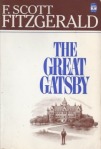F. Scott Fitzgerald – The Great Gatsby (Book Review, Mixed with Off-Topic Rambling)

F. Scott Fitzgerald – The Great Gatsby
I’m one of the few Americans to somehow make it to their mid-30s without reading The Great Gatsby. Finally trying it, though, I’m glad I waited. It’s a beautiful book, but one that I’m sure would have seemed dry and frustrating if it were forced on me as a youth. Its culture and vocabulary is a century old, while the prose is flowery and would be slightly daunting to a teenager. Why do we always insist on forcing adults’ ideas of classics onto children? Without the perspective to see the qualities that adults do, and also without the romanticism about a title that charmed previous generations, kids just find most classics off-putting. I think we’d be much better off using fun, age-appropriate novels in schools to foster a love of reading, so that the students will be motivated to seek out the classics when they’re ready.
The Great Gatsby still seems to be one of the most accessible ones, though, and that’s probably why so many people consider it to be the Great American Novel. With a light story, anger at a hypocritical society, and a short reading time, it must come as a relief to students picking this up right after The Scarlet Letter. It describes the upper-class people of the “Jazz Age” the the matter-of-factness of someone who knows no other way of life, but also with insightful criticism. Less frequently remarked upon is the fact that most of the story establishes very common tropes of romantic fiction, but the story takes an abrupt turn away from the comforting ending one would expect. It’s cynical and different, but in a way that doesn’t feel challenging.
Like many classics, Gatsby has beautiful writing, complex characters, and a weak plot. The prose has an efficiency that sets the scene and people, while leaving enough unsaid to keep them intriguing. The best parts of the story are watching them react to each other, whether it’s happily or angrily. Nick, the narrator, is amazingly passive in his own tale and usually serves as a stand-in for the similarly powerless reader, but his motivations and internal reactions to people make him surprising as well. That magic only falters when the plot has to move things along. Gatsby’s implausible rise is fortunately not shown first-hand, but the collection of people who end up around him is harder to swallow. The discoveries and misunderstandings that unravel the web of deceit near the end feel contrived, more like necessary steps to reach the climax than natural actions of these otherwise three-dimensional characters.
The Great Gatsby remains one of the rare classics that really does hold up well today. And for those students who found this page while looking for help on an essay, I’m just going to say: Don’t bother. I’m writing an intentionally vague, spoiler-free review, which is not what your teacher wants to see. But take heart in what I said in the first paragraph: If you didn’t like Gatsby, go find whatever sort of story you would like to read, whether or not it’s “low art”. Stories you’ll like are out there for you. Then try this book again in five or ten years for your own sake, and you’ll probably like it. And that is an idea you can take from this webpage to your teacher.
Grade: B
No trackbacks yet.